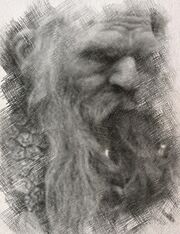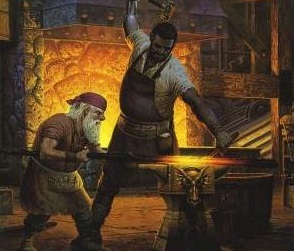
Sindri or Thélor
The Ironfists (Kh. "Ghamîn-dôr") or the Folk of Sindri (or Thélor the rich) were the fourth of the Seven Tribes of the Khazâd. Their history was a tragic one, for it was from their tribe chiefly, alongside that of their close kin the Blacklocks, that came movements of traitorous, Wicked Dwarves in service to the Enemy. While only a certain number of these folk aligned themselves so, selling their allegiances for Sauron's riches, a curse seemed to fall on all the house because of their deeds. Before any betrayal, however, the Ironfists awoke in central Middle-earth in the Elder Days, where they had contact with the Easterlings, and there for long years they prospered as equals to the other Dwarvish tribes, though they were ever a very secretive and isolated people. Perhaps this isolation and xenophobia was the cause of their later downfall.
See:
- Stoutaxes
- Firehorns
- Mornaugrim
- Zhélruka
Description[]
History[]
Sindri the Rich was the father of the Iron-Dwarves, as they were called. He and his people, like many Eastern Dwarves, awoke within the Spine of Arda, the great north-central mountain chain in the midst of the steppes and deserts peopled by the Men of Darkness. There he united his folk, and established the Dwarven kingdom and city-state of Gamil-Nâla.
Unwilling to desert their ancestral dwellings, the Dwarves became the neighbours of the local Hildor, harsh and primitive though they were, as was the usual nature of that race. Indeed, relations with these Easterlings never approached true friendship and alliance in a personal sense. On the contrary, first contact between them was hostile rather than cordial. The rude bows of horn and scimitars of wood used by the eastern Men were as mere beast's paws before the Iron-forged axes, swords, and crossbows of the Dwarves who had already mastered the craft of Steel. The Easterlings were awed and pacified, and negotiated with these Barkashad, as they called them, for clemency towards their westward march. Mutual toleration and exchange of goods and technologies was established as recompemse on behalf of both peoples, but maintained by mandate and threat rather than friendship.
The Easterlings dealt in food supplies and cultural gifts in return for the Ironfist's metals and weapons. That these people were enemies of the West, wherein dwelt other houses of the Naugrim and their allies, concerned the Ironfists not at all. "Business is business," many said, and it became a proverb amongst their people. Over the Ages they have wisely kept the secret of Steel to themselves, so that their hosts must always depend upon them. Thus, for long years, the Dwarves of the Fourth House existed long and mightily, and traded with other houses and peoples. They persisted through the First Age, though trading with peoples allied to Angband, and they survived the fall of the later at the end of the age, though accordingly many withdrew into isolation within their deep caverns.
Alas! In the Second Age, intra-Dwarvish strife ended their peace. Strife of words between King Sindri and his brother Thúlin escalated to a brief, bloody civil war, for Sindri had rejected Thúlin's reforms of the culture of his people to become more industrialized and less philosophical, though the movement had become prominent in the House. Indeed, even after the war and Thúlin's slaying, Sindri's folk had grown so corrupt, motivated by profit and industry, and sustained by no other principle than martial prowess and technical skill, that their lords hesitated not to accept gold from Mordor in payment for arming his minions in iron, with weapons of steel, for war against the Westlands. For most of the age, they refrained from direct support of the Dark Lord, though the cataclysm of the Akallabêth had, among many other results, collapsed their chief city Gamil-Nâla, and the exile of their king Buldinhad left them leaderless, and many had grown weary and willing to submit to Sauron's rule. Buldin largely removed his followers northwest, and in the Eastern Hills they delved Nurunkkhizdín, where there prospered after a fashion. They remained steadfast and ceased trade with Mordor, but their western kin did not welcome them. Threlin II moved the remnants of Thelor’s Folk further south in the late Second Age, and they established in the Ered Harmal the delving of Namagaluz. From there, after his return to his dark throne, Sauron summoned them to the battle of Dagorlad; but at the same time, the Ironfists received like summons from Durin V, reincarnation of the eldest lord of the Khazâd. Split between these conflicting summons, the Ironfists remained largely neutral in that war; few were willing to take the field against Durin´s heir, but fewer still could conceive of reasonable alliance against Sauron. Most of their people remained aloof, but the Ironfists nonetheless supplied Sauron's folk with raw metals and weapons for the war under duress, resulting in the hatred of other people. Strife again rose in the Dwarf-Kingdom of Gamil-Nâla; Ôrn, heir of Sindri, motivated by his reception of a Ring of Power, slew his rivals and laid claim to the throne of Gamil-Nâla. He was, in turn, murdered by Sindri’s daughter Thris, whose son Threlin became King. Exiled, the warriors of Ôrn fought for Sauron, and housing in the mountains of Mordor, and even beneath the Dark Tower itself, they became then the Mornaugrim, the Wicked-Dwarves, while their kin remained isolated in their deep dwellings.
In the aftermath of the Last Alliance, the Dwarves of the Westlands branded most of their Ironfist kin as renegades and turncoats. While in Nurunkkhizdín the folk of Buldin managed to eke out a living, and maintain their independent customs, their kin had no such fortune; for a curse seemed to follow their house after the dreadful war of the Second Age. The Dragon Wars of the Third Age devastated Namagaluz, and the Ered Harmal were ever afterwards infested with dragons. Robbed of their home, the eastern Ironfists were scattered across Rhûn, becoming a wandering and nomadic people split by diaspora, and forced to subsist as Tinkers, Mercenaries, shamans, fortune-tellers and other ruffianly professions among the superstitious Easterlings. Their reputation fell tremendously, and they were then often looked down upon and referred to as Gully Dwarves by their western kin. The leaderless Barkashad failed to establish any cities east of the Rhûnaer, and the most dignified professions a Dwarf-lad of that race could hope for were smelting weapons and performing divination or Alchemy on behalf of the Easterlings. The Barkashad have since adapted to their life as priests, shamans, and ministers to the Easterling tribes of the steppes. The former being an exploitive folk quick to wield advantage, and the latter beinf generally supersitious folk quick to adhere to any philosophy which they learned, the folk of Rhûn came to view the Dwarves (as they always have) with the same degree of superstitious awe as Westmen viewed the High-Elves. Naturally, Sindri's folk are eager to foster this perspective and not always by honest means. A good deal of charlatanry undoubtedly accounts for the Barkashad mysticism amongst the impressionable Easterlings. Yet in the making of steel, and all forms of ore-smelting, the Gully-Dwarves have still no rival save other Dwarves, and that skill at least they possess in truth; for the Men of Rhûn would have practically no iron in their lands without the aid of these folk, if it was not provided by Sauron, as the primitive folk always relied on trade with other peoples for advanced goods.
The folk of Nurunkkhizdín, on the other hand, withdrew into isolation soon after the founding of their realm. For long years in the Third Age, they prospered there, and delved for iron and copper in the hills-- until Orc raids began to devastate their people. Finally, a plague in the later age broke their peace; a sort of bizarre fungus was discovered in the deeps of their city, and its noxious effects slew many of their people. The Dwarves did all possible to them to heal their illnesses, but soon their kingdom became uninhabitable; and they suffered the same fate as their southerly kin; forced to wander the steppes and plains beyond and around the Sea of Rhûn, scraping out a living from the sale of their skills. So the house remains to this day, a shadow of their former glory, and a baneful reminder to the other Houses of the dangers of the infernal.
Culture[]

Ironfist-Dwarf instructing an Easterling Smith
Appearance[]
The Ironfists are relatively slim and spindly (by Dwarvish standards, that is). They mostly have a swarthy, sallow complexion, comparable to that of their Easterling neighbors, with yellowish skins and dark brown or black hair, and their eyes are darkling brown and narrow.
By Dwarvish standards, the appearance of the Ironfists seems relatively unkempt to the unused eye. They wear thick, ring-bound, and curly beards with long moustaches, often emulated after the Easterlings, and some shave their heads or wear their hair in buns or tails, after eastern fashion.
They garb in heavy Dwarf-Boots of leather with elaborate decoration, cloaks, and hoods and other clothes purchased from the Easterling Nomads, made mostly of leather, hides, and rough-spun linens. Their hoods sometimes resemble the cowls and turbans of desert-Easterlings, and their cloaks are usually light and rough. Finally, they often dress in many layers of various colors. All of these factors blend to render the Ironfists' appearances exotic in comparrison to the western Dwarves.
Dwarf-holds[]
- Kheledkhizdín (Akgundîm)
- Kheled-nâla
- Kibil-Tarag
- Gamil-nâla
- Namagaluz
- Nurunkhizdin
- Sigal-Nâra
- Uztarûrzahar
- Barazimabûl
- Mablâd-Dûm
Ironfists of renown[]
- Buldin
- Darsha
- Dworin
- Frár
- Lóni
- Nárin
- Nórin
- Ôrn the Ugly
- Sindri or Thélor the rich
- Thralin I
- Thralin II the Young
- Threlin I
- Threlin II
- Thris
- Thúlin
